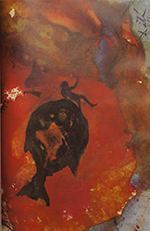
Death
"the tree line was a dark wound in a world that was nothing but sky" (523).
Flannery O'Connor's "Greenleaf" (1956; 1965)
Points
for Reflection
EBB: "Mother and Poet" (1862), 299-305
- does this narrator’s refusal to write another nationalist poem for Italy undercut her contributions to the Italian Risorgimento hitherto?
- does this narrator maintain that being a mother is a higher, more vital form of art than is creating poetry?
- is this an antiwar poem?
- does this mother think her own grief extraordinary—greater than the sorrow experienced by her compatriots?
- EBB is dramatizing the grief of Italian poet Olimpia Rossi Savio, Baronessa di Bernstrel. Does the poem contain clear evidence that its author is also a mother?
- the narrator alludes to Christ’s sacrificial love and sorrow that “reconciled so / The Above and Below” (ll.64-65). What of the narrator’s love and sorrow: do they bridge any gaps?
RB: "My Last Duchess" (1842), 83-84
- as imagined by the narrator, why might the painting of the Duchess indicate a "spot of joy" on her cheek? Also, what exactly does "spot of joy" (ll.14-15, 21) denote?
- of what does the narrator accuse the wife pictured in this painting, and how convincing is his argument?
- did the narrator express his grievances to his wife in no uncertain terms?
- where is the narrator's wife now?
- who is the narrator's audience (auditor), and what is the narrator's current endgame? Does it make sense that the narrator would tell his auditor the story behind the painting, given what the narrator is presently attempting to achieve?
- Browning could have placed any piece of art in the same vicinity as the Duchess's painting. Why might he have chosen the statue of Neptune taming a sea-horse (ll.54-56)?
- literary critic Robert Langbaum suggests, in The Poetry of Experience (1957), that the attentive reader is led to "identify" with Italian duke of the poem, and that his "conviction of matchless superiority, his intelligence and bland amorality, his poise, his taste for art, his manners" overwhelm the reader, causing us to suspend moral judgment because we prefer to participate in the duke’s power and freedom, in his hard core of character fiercely loyal to itself” (83). Do you agree with Langbaum's position?

from Un Biblia Sacra (1969)
Salvador Dalí
Dr. Paul Marchbanks
pmarchba@calpoly.edu
![]()
